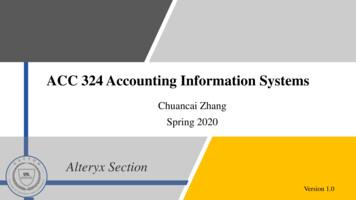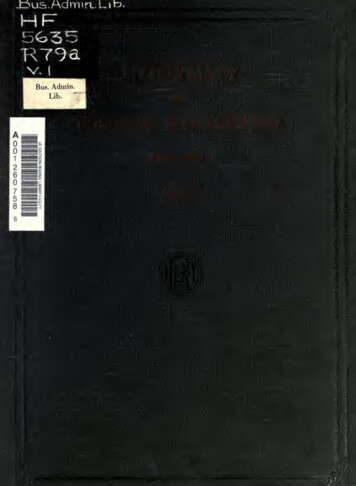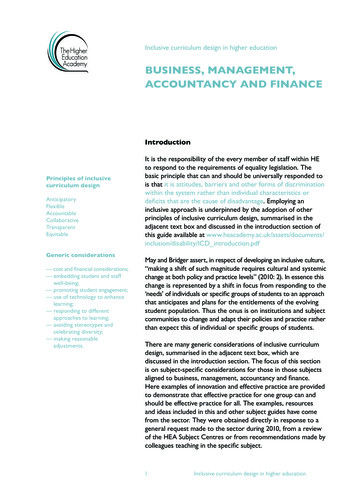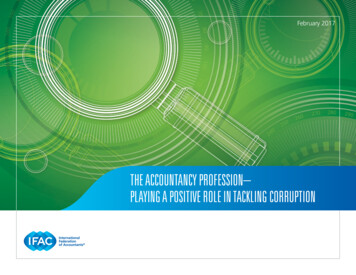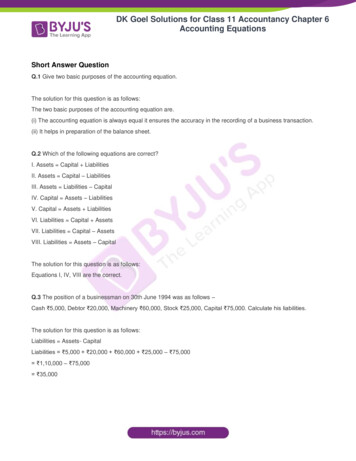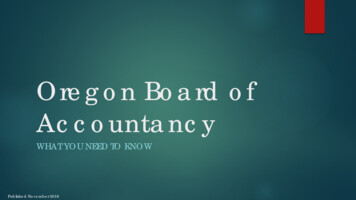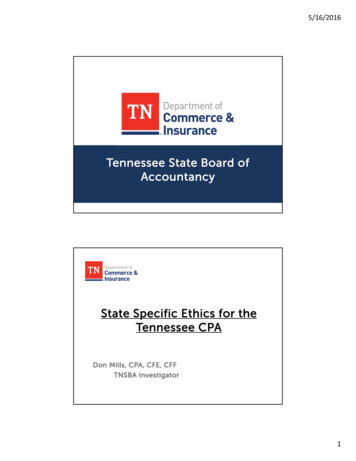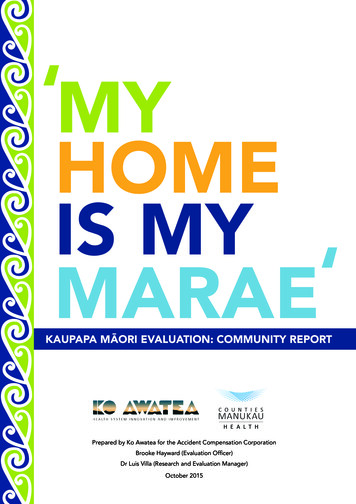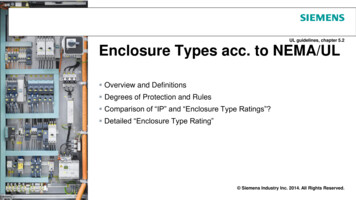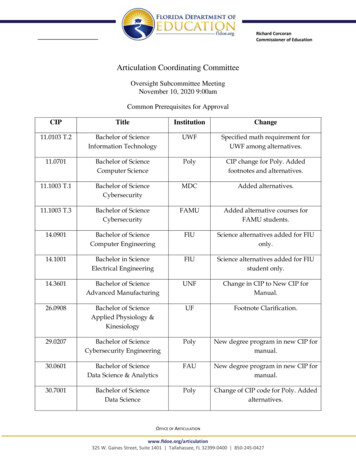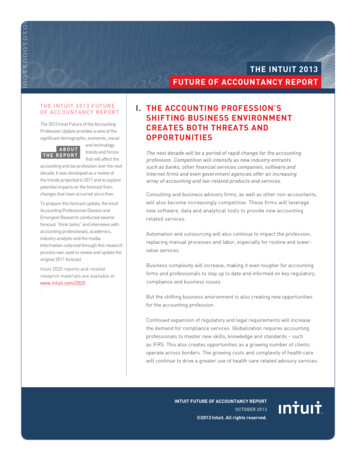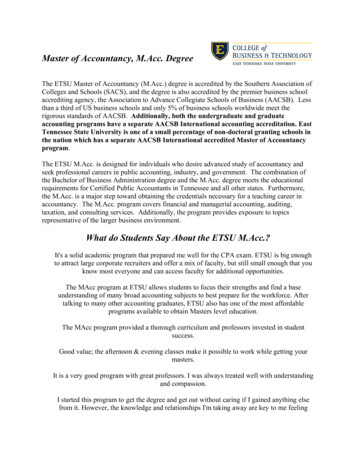
Transcription
Master of Accountancy, M.Acc. DegreeThe ETSU Master of Accountancy (M.Acc.) degree is accredited by the Southern Association ofColleges and Schools (SACS), and the degree is also accredited by the premier business schoolaccrediting agency, the Association to Advance Collegiate Schools of Business (AACSB). Lessthan a third of US business schools and only 5% of business schools worldwide meet therigorous standards of AACSB. Additionally, both the undergraduate and graduateaccounting programs have a separate AACSB International accounting accreditation. EastTennessee State University is one of a small percentage of non-doctoral granting schools inthe nation which has a separate AACSB International accredited Master of Accountancyprogram.The ETSU M.Acc. is designed for individuals who desire advanced study of accountancy andseek professional careers in public accounting, industry, and government. The combination ofthe Bachelor of Business Administration degree and the M.Acc. degree meets the educationalrequirements for Certified Public Accountants in Tennessee and all other states. Furthermore,the M.Acc. is a major step toward obtaining the credentials necessary for a teaching career inaccountancy. The M.Acc. program covers financial and managerial accounting, auditing,taxation, and consulting services. Additionally, the program provides exposure to topicsrepresentative of the larger business environment.What do Students Say About the ETSU M.Acc.?It's a solid academic program that prepared me well for the CPA exam. ETSU is big enoughto attract large corporate recruiters and offer a mix of faculty, but still small enough that youknow most everyone and can access faculty for additional opportunities.The MAcc program at ETSU allows students to focus their strengths and find a baseunderstanding of many broad accounting subjects to best prepare for the workforce. Aftertalking to many other accounting graduates, ETSU also has one of the most affordableprograms available to obtain Masters level education.The MAcc program provided a thorough curriculum and professors invested in studentsuccess.Good value; the afternoon & evening classes make it possible to work while getting yourmasters.It is a very good program with great professors. I was always treated well with understandingand compassion.I started this program to get the degree and get out without caring if I gained anything elsefrom it. However, the knowledge and relationships I'm taking away are key to me feeling
happy about having a career in accounting. The students are amazing and push each other towork harder and think deeper, the professors make students want to succeed and learn asmuch as possible, and the networking allowed me to accept a job offer for my dream job.I think it is a very robust program. The courses are engaging and develop an understandingof the history of our profession while still exploring contemporary issues. The material ishands on and, because of the smaller class sizes, group discussions facilitate a greaterunderstanding of topics.The value combined with the effort and commitment level of the faculty made the programwell worth the time and resourcesThis is a high level program that outstrips that of many other programs at the school plus itmore than prepared me for the mentality and focus necessary to succeed in publicaccounting.It's a great value and it's great that it is able to be structured around people's lives.StatisticsThe following are based on graduates of the M.Acc. program from Fall 2016-Fall 2019:Internships: 77% completed internships while in the M.Acc. programJobs:79% found jobs before graduation from the M.Acc. programCPA exam: 93% plan to take the exam, 31% have passed at least one part before graduationThe following are based on Fall 2019 enrollment:Average entrance GPA:3.61Average GMAT score:559Student/Teacher ratio:15:1Gender ratio female to male: 16:17Admission RequirementsIn general, the School of Graduate Studies admits students on a continuous basis, with preferredapplication deadlines of August 10 for Fall semester, December 5 for Spring semester, and May15 for Summer term.Graduate AdmissionsThe admissions process is administered online (http://www.etsu.edu/gradschool/). Applicationrequirements include: A bachelor's degree from a regionally accredited institution One official transcript from every college or university where the applicant has takencourses. An undergraduate GPA of 2.5 on a 4.0 scale for domestic students, and a GPA of 3.0 on a4.0 scale for international students
A completed application formA personal essay of 150-300 words, detailing your interests in a graduate program atETSUA non-refundable application fee of 55 ( 65 for international students)The Graduate Catalog provides a detailed description of requirements for admission to theGraduate School. Additional information is posted on the Graduate Admissions website. Forinformation on the GMAT, call 1-800-GMATNOW, or access their website at www.gmat.org.Please direct further questions concerning graduate school admission to Marc Tucker, GraduateProgram Specialist, (423) 439-4221, tuckermr@etsu.edu.Departmental AdmissionsA student applying for admission to the M.Acc. program must hold a bachelor’s degree from aregionally accredited college or university. International students must hold the equivalent of afour-year degree from a regionally accredited U.S. institution. All applicants to the M.Acc. arepresumed to be proficient in the use of word processing, spreadsheet, and presentation softwareas well as basic business mathematics. Specific admission criteria are as follows: Minimum undergraduate GPA of 2.5 Minimum GMAT score of 450 (The GMAT is waived if student has received anundergraduate degree with a major in accounting with a grade point average of 3.5 orhigher from ETSU or any other AACSB-accredited university within five years prior toregistering for the ETSU Master’s program. The GMAT is also waived for candidateswho have already passed the CPA exam.) Minimum TOEFL score of 550 (paper exam) or 213 (computer exam) if an internationalstudent Minimum formula score of 1,050 computed as (200 X undergraduate GPA) GMATscoreCandidates for the M.Acc. program must submit all required application materials before theyenroll in graduate-level business courses. Nondegree students must receive approval from theAssociate Dean for Graduate Studies in the College of Business and Technology beforeregistering for graduate business courses.The length of the M.Acc. program will depend upon a student’s prior academic work and thenumber of courses to be take per semester. The well-prepared full-time student who is notworking can complete the program in three semesters. However, the department stronglyadvises students to spread the program over four semesters so they can study for the CPA examthroughout the program and possibly work an internship. Part-time students can complete theprogram through evening classes at the ETSU main campus.If students do not have an undergraduate degree in accounting from ETSU, they may need totake prerequisite courses for the program. The M.Acc. Graduate Coordinator will evaluateundergraduate transcripts to determine what, if any, prerequisite courses are needed. Studentsmay be admitted if they lack only two courses. If prerequisite courses are required, they must be
taken in addition to the degree requirements. Below is a list of prerequisite courses (or theirequivalents) for the M.Acc. program:Prerequisite CoursesACCT 2010 Principles of Accounting I (3 credits)ACCT 2020 Principles of Accounting II (3 credits)ACCT 3010 Financial Accounting I (3 credits)ACCT 3020 Financial Accounting II (3 credits)ACCT 3110 Managerial Accounting (3 credits)ACCT 3320 Information Technology for Accounting (3 credits)ACCT 3410 Federal Income Tax (3 credits)ACCT 4010 Advanced Financial Accounting (3 credits)ACCT 4320 Data Analytics for Accounting (3 credits)ACCT 4610 Auditing Theory and Professionalism (3 credits)Although general business courses have not been listed as prerequisites for the ETSU M.Acc.program, students planning to take the CPA exam should check their transcripts with CPA exameligibility requirements to confirm that they have met the prerequisites for the exam.International students should contact Ricardo Tapia, our international graduate admissionsrecruiter for further information and requirements. His e-mail is etsuinternational@etsu.edu.M.Acc. OrientationStudents admitted to the M.Acc. Program are required by the College of Business andTechnology to attend the graduate business student orientation. The orientation is usually heldthe first Monday prior to the beginning of classes in the fall semester. If the student is unable toattend, he or she must answer a set of questions provided by the Dean’s Office prior toregistering for the following semester.Graduate Assistantship & Tuition Scholarship RequirementsA limited number of Graduate Assistantships and Tuition Scholarships are awarded on acompetitive basis to qualified students. A Graduate Assistantship waives your tuition (but notfees) each semester and pays you a stipend each month for nine months of the academic year. Inreturn you will work for the university 20 hours per week doing such activities as grading papers,helping professors with their research, data entry, and other jobs. A Tuition Scholarship waivesyour tuition (but not fees) each semester. In return you work for the university 8 hours eachweek of the academic year. For further information about GA and TS positions, please contactTracie Gamble, Executive Aide Graduate Studies at (423) 439-5314 or e-mail atgamblet@etsu.edu.Student loans also are available to eligible students. For further information on financial aid,please contact the Associate Dean of Graduate Studies or the ETSU Financial Aid office at (423)439-4300.
M.Acc. CurriculumThe core M.Acc. courses are designed to provide students with a strong technical accountingbackground and the concentrations provide the flexibility to create an experience unique to theindividual’s professional and academic interests. The courses will also help students learn skillsnecessary to succeed in an accounting career and on the CPA or CMA Exams, while alsoexploring future areas of specialization and engaging with top-ranked faculty who are personallyinvested in students’ long-term career success.
Core CoursesThe M.Acc. program consists of a minimum of seven core courses, three concentration courses,and a capstone course, for a total of 33 semester hours. The accountancy core courses cover thesix major areas of accounting practice: financial and managerial accounting, auditing, taxation,regulation, and international accounting. An accounting analytics course is also included in thecore curriculum.ConcentrationsIn addition to the core curriculum, M.Acc. students must choose one of four concentrationsavailable: Taxation, Audit, Controllership, and Generalist. Students take three courses withintheir chosen concentration. These concentrations are described in more detail below.Audit ConcentrationOverviewThe Audit Concentration provides students with advanced knowledge of auditing standards,internal control, and financial regulations. Students are taught how to review, analyze andevaluate financial statements in order to provide useful and accurate information for investorsand other decision-makers. Students are also required to work in groups to build teamworkproficiency, an essential skill in the audit profession. Graduates of the program emerge withstrong analytical skills, a solid understanding of professional ethics, and the ability to act withprofessional skepticism and due care.Possible CareersAudit careers include assurance service positions with Big Four, national, regional, and localpublic accounting firms, as well as industry. Investigative services such as the FBI, CIA, and theIRS also hire forensic auditors to investigate financial criminal activity. The Audit Concentrationfurthermore lays a strong foundation for careers in financial services, such as commercialbanking and investment banking.Academic CoursesThe Audit Concentration consists of three audit courses (9 hours) of the minimum thirty-three(33) M.Acc. courses. The audit courses consist of Advanced Auditing Practice, ForensicAuditing, and Internal Auditing and Control Systems. An approved internship in auditing mayreplace one of these courses. See the Chair of Accountancy or Graduate Coordinator for moreinformation.SkillsetAudit and assurance service providers are expected to interact with managers, employees, auditcommittees, regulators, and other auditors on a team. Thus, it is important that students developstrong interpersonal skills, professionalism, and group-work skills. Students wishing to pursue acareer in audit should have a strong understanding of GAAP, financial statements, and auditingstandards. Auditors must also possess strong ethical standards which allow him or her to act withintegrity and independence in all matters, endurance for long audits, and possess excellentcommunication skills.
Tax ConcentrationOverviewThe Tax Concentration combines in-depth tax courses with foundational accounting courses toprovide a balanced and thorough groundwork for a variety of career paths. The TaxConcentration provides M.Acc. students with advanced tax knowledge and skills through boththe study and practice of tax law. The core taxation courses focus on critical thinking, problemsolving and communication skills. Students will work within the tax code, examine case studies,and hone their ethical acumen. Students should graduate fully equipped to transition into a careerwith a strong understanding of the tax system and an ability to apply it to personal and businesstax preparation and planning.Possible CareersTax careers include employment in CPA firms, corporate tax offices, and government, includingthe Internal Revenue Service. The tax industry offers diverse options such as personal incometax preparation, corporate tax returns, and estate planning, among others.Academic CoursesThe Tax Concentration consists of three academic taxation courses (9 hours) of the minimumthirty-three (33) M.Acc. courses. These courses include Tax Research, Taxation of FlowThrough Entities, and Advanced Tax Topics. An approved internship in taxation may replaceone of these courses. See the Chair of Accountancy or Graduate Coordinator for moreinformation.SkillsetStudents exploring taxation as a career should possess a strong understanding of tax laws and theeffect of tax laws on individuals and corporations. He or she should be able to apply knowledgeof financial statements and taxation principles to future tax planning, utilizing problem solvingand analytical skills in the process. Students should also possess the ability to conciselycommunicate complex tax concepts to individuals who do not have a tax background.Controllership ConcentrationOverviewThe Controllership Concentration reflects the emerging role of accountants and financialprofessionals as key members of the management team in the corporate world. Theconcentration equips students with an understanding of financial reporting and advancedmanagerial accounting as applied in both the manufacturing and service sectors. Students willlearn how to implement procedures such as capital and operational budgeting, principles of leanmanagement, Six Sigma, cost of quality, software solutions to financial challenges, internalcontrols, and asset management. Students should graduate with a holistic understanding offinancial leadership in the strategic and operational decision-making processes of anorganization.
Possible CareersBoth current and future CPAs and CMAs should consider the Controllership Concentration ifplanning to aspire to senior management positions. Controllers manage the accountingdepartment in an organization and serve in a similar role as a Chief Financial Officer (CFO). Theroles are sometimes combined in small organizations. Controllership career options includingmanufacturing firms, non-profits, and service industries.Academic CoursesThe Controllership Concentration consists of three concentration controllership courses (9 hours)of the minimum thirty-three (33) M.Acc. courses. The controllership-specific courses includeControllership and Financial Leadership, Internal Auditing and Control Systems, and eitherApplied Corporate Finance or Not for Profit Entity Accounting. An approved controllershipinternship may replace any of these courses except for Controllership and Financial Leadership.See the Chair of Accountancy or Graduate Coordinator for more information.SkillsetA student in the Controllership Concentration should develop strong analytical, problem-solving,and leadership skills. He or she will be expected to have a thorough understanding of budgeting,cost-benefit theory, and financial statement reporting. In addition, a controllership positionrequires an ability to provide financial consultation to upper management and aid in decisionmaking for the firm.Generalist ConcentrationOverviewThe Generalist Concentration reflects the choice of many millennial students who want to try outa variety of options. Students will choose courses that match their desired interests. Studentsshould graduate with a broad array of skills that will enable them to begin to pursue a variety ofcareer paths.Possible CareersDepending on the courses chosen, students have the opportunity to pursue multiple career pathsincluding the ones mentioned in the concentrations described above.Academic CoursesThe Generalist Concentration consists of three concentration courses (9 hours) of the minimumthirty-three (33) M.Acc. courses. The generalist-specific courses include the student’s choice of awide variety of courses included under the Tax, Audit, and Controllership concentrations. Seethe Chair of Accountancy or Graduate Coordinator for more information.SkillsetStudents with a generalist concentration will develop a variety of skillsets based on the courseschosen.
Capstone CourseThe M.Acc. capstone course, ACCT 5890, provides opportunities for students to applyknowledge and skills. Options available to students include readings and research in preparationfor passage of an approved professional exam, special study of an approved accounting topic,internship in a professional accounting position, and participation in an auditing or consultingengagement.Other Important InformationCourse TimesThe M.Acc. courses are offered in the late afternoon (4:00 – 6:50 p.m.) and evening (7:00 – 9:50p.m). Core accounting courses are offered in the Fall, Spring, and Summer semesters. Theconcentration courses are offered in different semesters so students need to plan their schedulesahead with the graduate coordinator.Degree CompletionStudents who go to school full-time usually take 9 hours per semester. Students who work fulltime usually take 9 hours per semester. The time to complete the program depends on your workschedule, the number of foundation courses (if any) required, and other responsibilities thestudent is balancing. Many students also choose to study for and take parts of the CPA examwhile they are pursuing their degree. Typically, students complete the program in foursemesters, taking three courses in three semesters and two in the last one.CPA ExamAll M.Acc. students are encouraged to sit for the CPA exam during their time in the program. Theexam is an excellent way to prepare the student for his or her professional career. Private CPAreview courses are available to assist students in their studies. However, M.Acc. students are urgedto make their coursework their first priority as keeping at least a 3.0 GPA is required for the M.Acc.program. For further information on ETSU’s Master of Accountancy program, pleasecontact the following:Dr. Michelle S. Freema
advises students to spread the program over four semesters so they can study for the CPA exam throughout the program and possibly work an internship. Part-time students can complete the program through evening classes at the ETSU main campus. If students do not have an undergraduate degree i
